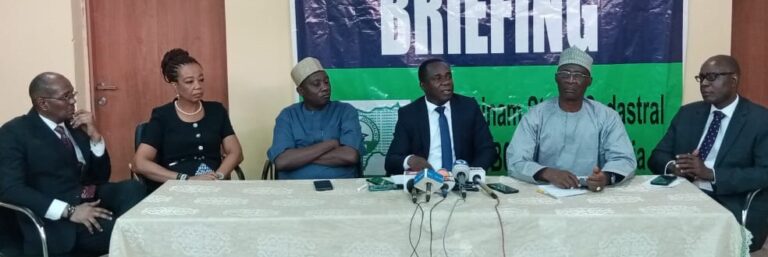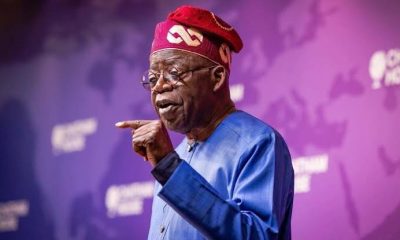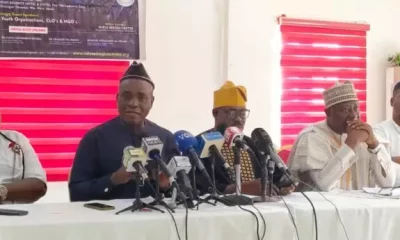Headline
Petrol subsidy: Association wants more interventions to cushion effects

The Association of Capital Market Academics of Nigeria (ACMAN) has appealed to the Federal Government to scale up efforts to ameliorate difficulties faced by Nigerians due to petrol subsidy removal.
The President of ACMAN, Prof. Uche Uwaleke said this in a news briefing on Wednesday in Abuja while assessing key policy measures rolled out by President Bola Tinubu in his first 100 days in office.
ACMAN is the umbrella body of lecturers and researchers in Nigeria’s university system and the financial market industry committed to development of Nigerian capital market through teaching, research and advocacy.
The event was held with a view to offering suggestions regarding the effective implementation of the policies.
Uwaleke commended the Federal Government for policies to end fuel subsidy and unify multiple exchange rates, saying that they seemed to boost confidence in the economy.
According to Uwaleke, the two policies which defined the administration’s first 100 days in office were largely welcomed by both domestic and foreign investors.
“Nowhere has this confidence manifested better than the stock market where the benchmark index (NGX ASI) hits the highest level ever in the history of Nigerian stock market.
“It is over 68000 points with year-to-date return now above 30 per cent.
“But these reforms have left in their wake unpalatable outcomes which have made life more difficult especially for the ordinary Nigerian.
“Inflation rate is on the rise with food prices largely unaffordable.
“There is evidence of declining economic activities with fewer vehicles on the roads and reduced work days in both private and public sectors.
“Similarly, not a few micro and small businesses have reduced their scale of operations due largely to inability to afford the high cost of fuel,’’ Uwaleke said.
He emphasised the need for a reduction in cost of governance and the money channelled toward cushioning the effects of petrol subsidy removal.
Uwaleke urged the Federal Government to scale up interventions in Micro Small and Medium Enterprises (MSMEs) and agriculture, saying that the current size is small at less than One trillion Naira.
“ We are convinced that more money can be made available to cushion the negative impact of fuel subsidy removal from reducing cost of governance, plugging revenue leakages and tackling the challenge of crude oil theft,’’ he said.
Uwaleke said that Nigeria looses over one billion dollars to crude oil theft monthly.
“A recent OPEC report puts the country’s crude oil output at 1.2mbpd indicating huge volume deficit of circa 500,000mbpd compared to the 2023 budget target of 1.69mbpd and the OPEC quota of 1.74mbpd.
“At a conservative crude oil price of USD85 per barrel, the loss to Nigeria in one month is over $1 billion.
“We believe that swiftly dealing with the menace of crude oil theft will put the Federal Government in a stronger position to scale up compensation measures.
“This includes the implementation of a new minimum wage for workers as well as the programme on food security expected to drive down prices,’’ he said.
Uwaleke further commended Tinubu for implementing some Executive Orders to suspend certain fiscal policies contained in the Finance Act 2023.
He also applauded the setting up of Presidential Committee on Fiscal Policy and Tax Reforms and the unveiling of his eight-point agenda.
Uwaleke also hailed Tinubu’s recent engagements with international investors in India and the UAE.
“We are excited by their prospects and hope the pledges made by these investors materialise in view of their potential long-term positive impact on external reserves, forex liquidity and job opportunities.
“To this end, the government must walk the talk regarding aspects of its eight-point agenda to do with security, rule of law and anti-corruption,’’ Uwaleke said.
He said that ACMAN was concerned that the forex market remained illiquid “and volatility in exchange rates has persisted despite the naira float policy that followed the unification of exchange rates’’.
“To make matters worse, the parallel premium has continued to widen seemingly defeating one of the objectives of the naira float,” Uwaleke said.
In view of the huge imports from China, Uwaleke said the association is of the view that the Central Bank of Nigeria (CBN) revisits the currency swap arrangement with China.
According to him, to a scale that reduces significantly the dependence on US dollars for imports from China.
On the supply side, he called for deliberate efforts to diversify the export base.
“The government should give support to the CBN in the implementation of RT 200 programme especially in relation to port reforms while it works on the ease of doing business to pave way for increased foreign investments.
“We believe that unlocking value in dead assets is one way to improve the country’s fiscal liquidity.
“We encourage the new administration to speed up the process of privatising government enterprises, including the NNPCL, not by selling to a few individuals or companies but through the capital market for transparency and inclusiveness,’’ he said.
Uwaleke also urged the Federal Government to explore asset securitisation as a means of financing developmental projects in the country.
Headline
EFCC bars dollar transactions, orders embassies to charge in naira

The Economic and Financial Crimes Commission has barred foreign missions based in Nigeria from transacting in foreign currencies and mandated them to use Naira in their financial businesses.
The EFCC has also mandated Nigerian foreign missions domiciled abroad to accept Naira in their financial businesses.
The anti-graft agency said the move is to tackle the dollarisation of the Nigerian economy and the degradation of the naira
The Commission, therefore, asked the government to stop foreign missions in Nigeria from charging visa and other consular services in foreign denominations.
The EFCC gave the advisory in a letter to the Minister of Foreign Affairs, Amb. Yusuf Tuggar, for onward transmission to all foreign missions in the country.
In the letter, the EFCC said it issued the advisory because the practice of paying for consular services in dollars was in conflict with extant laws and financial regulations in Nigeria.
In a letter dated April 5, 2024, which was addressed to the Minister of Foreign Affairs, Ambassador Yusuf Tuggar, titled: “EFCC Advisory to Foreign Missions against Invoicing in US Dollar,” the EFCC Chairman, Ola Olukoyede expressed dismay over the invoicing of consular services in Nigeria by foreign missions in dollars.
The EFCC cited Section 20(1) of the Central Bank of Nigeria Act, 2007, which makes currencies issued by the apex bank the only legal tender in Nigeria.
The letter read, “I present to you the compliments of the Economic and Financial Crimes Commission, and wish to notify you about the commission’s observation, with dismay, regarding the unhealthy practice by some foreign missions to invoice consular services to Nigerians and other foreign nationals in the country in United States dollar ($).
“It states that ‘the currency notes issued by the Bank shall be the legal tender in Nigeria on their face value for the payment of any amount’.
“This presupposes that any transaction in currencies other than the naira anywhere in Nigeria contravenes the law and is, therefore, illegal.”
The commission further stated that the rejection of the naira for consular services in Nigeria by certain missions, along with non-compliance with foreign exchange regulations in determining service costs, is not just unlawful but also undermines the nation’s sovereignty embodied in its official currency.
The letter continues: “This trend can no longer be tolerated, especially in a volatile economic environment where the country’s macroeconomic policies are constantly under attack by all manner of state and non-state actors.
“In light of the above, you may wish to convey the commission’s displeasure to all missions in Nigeria and restate Nigeria’s desire for their operations not to conflict with extant laws and regulations in the country.”
Diplomatic sources said yesterday, May 10, that some embassies were wondering whether the EFCC’s advisory represented the position of the Federal Government.
Headline
Prince Harry visits sick Nigerian soldiers in Kaduna

Prince Harry and his team visited the 44 Nigerian Army Reference Hospital in Kaduna to interact with wounded soldiers who are receiving treatment.
The Duke of Sussex is in Nigeria with his wife to champion the Invictus Games, which Harry founded to aid the rehabilitation of wounded and sick servicemembers and veterans.
Nigeria joined the Invictus Community of Nations in 2022 becoming the first African country to join.
Prince Harry’s visit to Kaduna came 68 years after his late grandmother Queen Elizabeth II visited the state during the time of the late Premier of Northern Region Sir Ahmadu Bello.




-

 Headline2 days ago
Headline2 days agoSuspend cybersecurity levy– Reps to CBN
-

 Headline2 days ago
Headline2 days agoTinubu resumes work after foreign trip
-

 Business2 days ago
Business2 days agoNigeria needs over $2bn to revive Ajaokuta Steel Plant, says Minister
-

 Headline3 hours ago
Headline3 hours agoPrince Harry visits sick Nigerian soldiers in Kaduna
-

 News2 days ago
News2 days agoShan George’s money returned to Zenith Bank account
-

 Entertainment3 hours ago
Entertainment3 hours agoAMVCA Cultural Day: BBNaija’s Neo, Venita win Best Dressed Male, Female
-

 Metro3 hours ago
Metro3 hours agoEx-Sports Minister laments after hospital neglected him for hours over N80000 deposit











